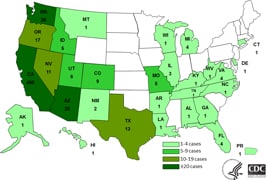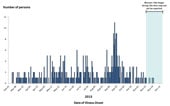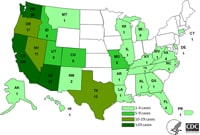Skin chicken and brown in oil. Cover and simmer for 10 minutes; remove and put into casserole. Sautee onion and pepper in skillet. Drain peaches, reserving syrup. Mix cornstarch, soysauce, vinegar and 1 cup peach syrup; boil until clear. Add peaches and tomatoes. Pour contents of skillet over chicken. Cover caserole and bake 40 minutes […]
Chicken
Mandarin Chicken Crepes
In large bowl, combine flour and salt. In small dish, whisk together eggs, milk and 1 tablespoon of oil; pour into flour mixture. In 6 inch skillet or crepe pan, heat 1/4 teaspoon oil over medium heat. Pour 2 tablespoon batter in pan; swirl into thin layer. Cook until bottom is golden brown, then flip […]
Malibu Chicken
Combine flour, salt and pepper. Stir egg and water together with a fork. Coat each chicken piece with flour, dip into egg mixture and then coat with crumbs. Press crumbs in firmly. Heat oil and butter in large skillet over medium heat. Brown chicken 4 to 5 minutes on each side. Place browned chicken on […]
Five-spice Baked Chicken
Place first four ingredients on foil with dull side down. Place chicken breast on top. Mix together remaining ingredients and pour over breast. Bake at 375 degrees for 45 to 50 minutes.
Meat Fish Rub
This seasoning rub can be used on all types of wild game and fish. Dust the meat of fish before grilling or smoking.
July 31, 2014 (Final Update): Multistate Outbreak of Multidrug-Resistant Salmonella Heidelberg Infections Linked to Foster Farms Brand Chicken
Latest Case Count Map

- A total of 634 persons infected with seven outbreak strains of Salmonella Heidelberg were reported from 29 states and Puerto Rico from March 1, 2013 to July 11, 2014.
- 38% of ill persons were hospitalized, and no deaths were reported.
- Most ill persons (77%) were reported from California.
- The current outbreak appears to be over as the number of reported infections has returned to the expected number for this time of year.
- Epidemiologic, laboratory, and traceback investigations conducted by local, state, and federal officials indicated that consumption of Foster Farms brand chicken was the source of this outbreak of Salmonella Heidelberg infections.
- The U.S. Department of Agriculture’s Food Safety and Inspection Service (USDA-FSIS) has determined that measures under taken by the firm to prevent Salmonella contamination of raw chicken have been successful.
- The outbreak strains of Salmonella Heidelberg were resistant to several commonly prescribed antibiotics. Although these antibiotics are not typically used to treat Salmonella blood infections or other severe Salmonella infections, antibiotic resistance can be associated with increased risk of hospitalization in infected individuals.
- It is not unusual for raw poultry from any producer to have Salmonella bacteria.
- CDC and USDA-FSIS recommend consumers follow food safety tips to prevent Salmonella infection from handling or consuming raw poultry from any producer.
- Consumers should still check their freezers for recalled Foster Farms brand chicken products and should not eat them.
Recall, Case Count & Investigation Update: Multistate Outbreak of Multidrug-Resistant Salmonella Heidelberg Infections Linked to Foster Farms Brand Chicken
Latest Case Count Map
- On July 3, 2014, Foster Farms recalled an undetermined amount of chicken products that may be contaminated with a particular strain of Salmonella Heidelberg.
- The recall resulted from USDA-FSIS identifying one of the outbreak strains of Salmonella Heidelberg in an intact sample of Foster Farms brand chicken with labeling information collected from the home of a person infected with the same strain in California.
- Although the recalled chicken had production dates of March 8, 10, and 11, 2014, USDA-FSIS and CDC are concerned that the recalled chicken could still be in people’s freezers.
- Consumers should check their freezers for the recalled chicken and should not eat it.
May 27, 2014 (Investigation Update): Multistate Outbreak of Multidrug-Resistant Salmonella Heidelberg Infections Linked to Foster Farms Brand Chicken
The investigation continues into Salmonella Heidelberg infections likely related to Foster Farms chicken. As of May 22, 2014, a total of 574 persons infected with seven outbreak strains of Salmonella Heidelberg have been reported from…
February 24, 2014 (Final Update) Outbreak of Salmonella Heidelberg Infections Linked to Tyson Brand Mechanically Separated Chicken at a Correctional Facility
- A total of nine persons infected with the outbreak strain of Salmonella Heidelberg were reported from Tennessee.
- Two (22%) of nine ill persons were hospitalized, and no deaths were reported.
- All of the ill persons were incarcerated at a single correctional facility located in Tennessee.
- This strain of Salmonella Heidelberg is commonly reported to PulseNet. Twenty-three additional persons infected with this same strain were identified from 15 other states.
- Investigations determined that these ill persons were not related to the outbreak in Tennessee.
- Sources of the infections in these 15 states were not identified.
- Epidemiologic and traceback investigations conducted by Tennessee and federal officials indicated that consumption of Tyson brand mechanically separated chicken was the source of the outbreak of Salmonella Heidelberg infections at the Tennessee correctional facility.
- On January 10, 2014, Tyson Foods, Inc. recalled approximately 33,840 pounds of mechanically separated chicken products that may be contaminated with Salmonella Heidelberg.
- Institutions that purchased recalled chicken products should not serve them.
- The recalled products were not available for consumer purchase in retail stores.
- CDC’s NARMS laboratory conducted antibiotic resistance testing on Salmonella Heidelberg isolates collected from nine ill persons in Tennessee infected with the outbreak strain and one isolate collected from leftover mechanically separated chicken product.
- Of the nine isolates collected from ill persons, two (22%) were multidrug-resistant (defined as resistant to at least one antibiotic in three or more antibiotic classes) and seven (78%) were pansusceptible (susceptible to all antibiotics tested).
- The one isolate collected from leftover mechanically separated chicken product was pansusceptible.
- It is not unusual for raw poultry from any producer to have Salmonella bacteria. CDC and USDA-FSIS recommend institutions follow food safety tips to prevent Salmonella infection from raw poultry produced by any brand.
- This outbreak of Salmonella Heidelberg infections was not related to the multistate outbreak of multidrug-resistant Salmonella Heidelberg infections linked to Foster Farms brand chicken.
December 19, 2013 (Investigation Update): Multistate Outbreak of Multidrug-Resistant Salmonella Heidelberg Infections Linked to Foster Farms Brand Chicken

- As of December 18, 2013, a total of 416 persons infected with seven outbreak strains of Salmonella Heidelberg have been reported from 23 states and Puerto Rico.
- 39% of ill persons have been hospitalized, and no deaths have been reported.
- Most ill persons (74%) have been reported from California.
- Epidemiologic, laboratory, and traceback investigations conducted by local, state, and federal officials indicate that consumption of Foster Farms brand chicken is the likely source of this outbreak of Salmonella Heidelberg infections.
- On October 7, 2013, U.S. Department of Agriculture’s Food Safety and Inspection Service (USDA-FSIS) issued a Public Health Alert due to concerns that illness caused by Salmonella Heidelberg is associated with chicken products produced by Foster Farms at three facilities in California.
- On October 10, 2013, USDA-FSIS announced that Foster Farms submitted and implemented immediate substantive changes to their slaughter and processing to allow for continued operations.
- This investigation is ongoing. USDA-FSIS is prepared to take additional actions or expand the investigation based on new evidence.
- On October 12 and October 17, 2013, Costco’s El Camino Real store located in South San Francisco, California recalled more than 23,000 units of rotisserie chicken products due to possible Salmonella Heidelberg contamination.
- Although the “best by” dates have passed for these products, consumers may have frozen them for consumption at a later date.
- Consumers should check their homes and freezers and should not eat the recalled chicken products. Retailers and food service establishments should not serve them.
- The outbreak strains of Salmonella Heidelberg are resistant to several commonly prescribed antibiotics. This antibiotic resistance may be associated with an increased risk of hospitalization.
- It is not unusual for raw poultry from any producer to have Salmonella bacteria. CDC and USDA-FSIS recommend consumers follow food safety tips to prevent Salmonella infection from raw poultry produced by Foster Farms or any other brand.


